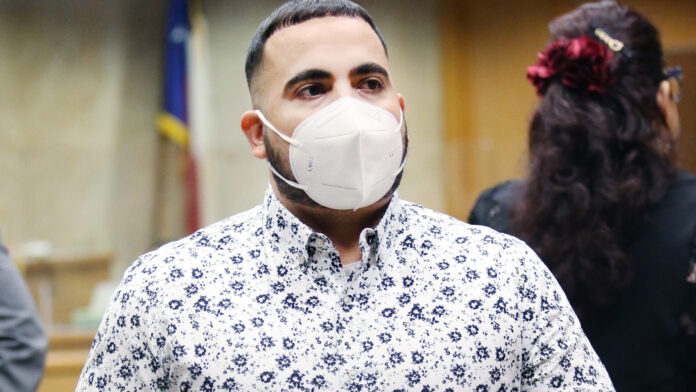
EDINBURG — The last of many experts to take the stand in the trial of the 2016 H-E-B shooting in Palmview said Friday that the suspect knew what he did was wrong and was not insane at the time.
The opinion came from forensic psychiatrist Michael R. Arambula, who took the stand in the eighth day of testimony in the trial of 31-year-old Mission resident Raul Lopez.
He is charged with murder, three counts of attempted murder, three counts of aggravated assault with a deadly weapon and a count of attempted capital murder of multiple persons.
He has pleaded not guilty and is pursuing an insanity defense.
Prosecutors allege Lopez fired at least 15 shots from a 9mm Desert Eagle handgun on Nov. 28, 2016, into a breakroom at the grocery store at Goodwin Road and U.S. Expressway 83 at around 3:30 a.m. as overnight workers were eating lunch.
Mario Pulido, 48, was killed in the shooting. Billy Joe Martinez, Rafael Martinez and Frailan Garza were all injured.
The final days of trial have come to what defense attorney O. Rene Flores dubbed a “battle of the experts” during opening arguments.
Arambula is the fourth expert to testify and told jurors that he did not believe Lopez suffered from schizophrenia, adding he knew what he did was wrong because he called 9-1-1 on himself and tossed the weapon in an empty lot.
The forensic psychiatrist said he also came to this conclusion because Lopez was at his house while on the 9-1-1 call and told his wife he was sorry and that she should stay away from him because the police were on the way.
He also said Lopez’s choice to throw the gun in the empty lot and then tell investigators where it was at after his interrogation indicates he knew what he was doing was wrong.
The interrogation also influenced Arambula’s opinion because Lopez asked about what charges he was facing and what those consequences were, specifically asking about lethal injection.
As for his opinion on Lopez not suffering from schizophrenia, Arambula said the symptoms Lopez complained of during his interview with the man, which included hearing voices and paranoia, did not square with the forensic psychiatrist’s experience in treating people with schizophrenia.
Specifically, Arambula said Lopez could not provide details about the voices or his paranoid delusions like people who suffer from schizophrenia, and because those delusions did not impact his ability to be interviewed as they do in other patients.
To come to his conclusions, Arambula interviewed Lopez via videoconferencing with a translator on one occasion, reviewed two other expert reports in the case, as well as jail and medical records, and police reports.
Arambula also noted that Lopez would not talk about the H-E-B shooting and was frustrated and irritated during his interview with the man.
The opinions of the medical experts have differed, with one expert saying he was schizophrenic and did not know what he was doing was wrong, and another saying that while he was schizophrenic Lopez exaggerated some of his symptoms.
Another expert said Lopez suffered from a panic disorder, but that they were unable to determine whether he had an unspecified psychosis or was lying about symptoms for personal gain.
Prosecutors have presented evidence during the trial suggesting that Lopez was a disgruntled employee who was on the brink of being fired when he attacked his co-workers, with the man’s last write-up coming just 12 days before the shooting.
Defense attorneys, however, have presented evidence of a man long suffering from undiagnosed schizophrenia who broke from reality that night and shot into the H-E-B because the voices told him that was the only way to save his family.
Both the state and defense closed early Friday afternoon.
During the course of the two-week trial, the jury has seen 348 exhibits and heard from 23 witnesses, including four defense witnesses.
The parties will reconvene Monday morning for closing arguments followed by jury deliberations.
What the experts said
>> Tomas A. Gonzalez, a forensic psychiatrist: Lopez suffers from paranoid schizophrenia and did not know what he did was wrong at the time of the shooting.
>> Johanna Torres-Santiago, a forensic psychiatrist: Lopez suffers from a panic disorder. She was unable to determine whether he had an unspecified psychosis or was exaggerating his symptoms for personal gain.
>> Gregorio Piña, a forensic psychologist: Lopez suffered from mild to moderate schizophrenia in 2018, but was exaggerating his symptoms for personal gain. He also said that Lopez would likely still harm others and that his condition would only deteriorate without treatment. Schizophrenia is a lifelong illness.
>> Michael R. Arambula, a forensic psychiatrist: Lopez suffers from an unspecified depressive disorder with clear evidence of symptom exaggeration. He is also anti-social, aggressive and has a paranoid personality trait. His conclusion is that Lopez knew his conduct was wrong and that at the time of the shooting he was sane.



